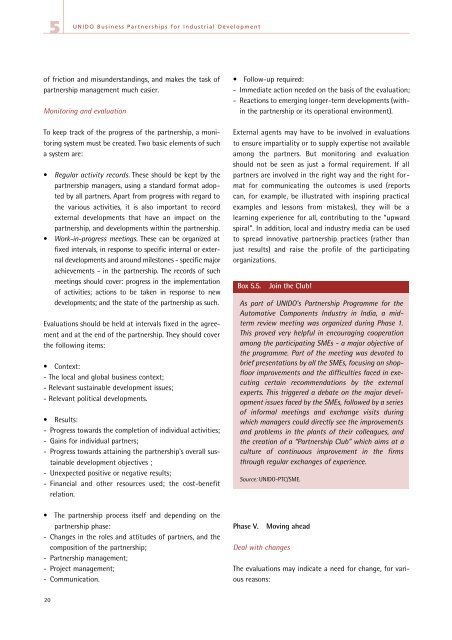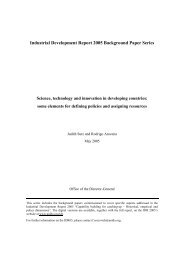Partnership Guide - Unido
Partnership Guide - Unido
Partnership Guide - Unido
Create successful ePaper yourself
Turn your PDF publications into a flip-book with our unique Google optimized e-Paper software.
20<br />
5<br />
UNIDO Business <strong>Partnership</strong>s for Industrial Development<br />
of friction and misunderstandings, and makes the task of<br />
partnership management much easier.<br />
Monitoring and evaluation<br />
To keep track of the progress of the partnership, a monitoring<br />
system must be created. Two basic elements of such<br />
a system are:<br />
• Regular activity records. These should be kept by the<br />
partnership managers, using a standard format adopted<br />
by all partners. Apart from progress with regard to<br />
the various activities, it is also important to record<br />
external developments that have an impact on the<br />
partnership, and developments within the partnership.<br />
• Work-in-progress meetings. These can be organized at<br />
fixed intervals, in response to specific internal or external<br />
developments and around milestones - specific major<br />
achievements - in the partnership. The records of such<br />
meetings should cover: progress in the implementation<br />
of activities; actions to be taken in response to new<br />
developments; and the state of the partnership as such.<br />
Evaluations should be held at intervals fixed in the agreement<br />
and at the end of the partnership. They should cover<br />
the following items:<br />
• Context:<br />
- The local and global business context;<br />
- Relevant sustainable development issues;<br />
- Relevant political developments.<br />
• Results:<br />
- Progress towards the completion of individual activities;<br />
- Gains for individual partners;<br />
- Progress towards attaining the partnership's overall sustainable<br />
development objectives ;<br />
- Unexpected positive or negative results;<br />
- Financial and other resources used; the cost-benefit<br />
relation.<br />
• The partnership process itself and depending on the<br />
partnership phase:<br />
- Changes in the roles and attitudes of partners, and the<br />
composition of the partnership;<br />
- <strong>Partnership</strong> management;<br />
- Project management;<br />
- Communication.<br />
• Follow-up required:<br />
- Immediate action needed on the basis of the evaluation;<br />
- Reactions to emerging longer-term developments (within<br />
the partnership or its operational environment).<br />
External agents may have to be involved in evaluations<br />
to ensure impartiality or to supply expertise not available<br />
among the partners. But monitoring and evaluation<br />
should not be seen as just a formal requirement. If all<br />
partners are involved in the right way and the right format<br />
for communicating the outcomes is used (reports<br />
can, for example, be illustrated with inspiring practical<br />
examples and lessons from mistakes), they will be a<br />
learning experience for all, contributing to the “upward<br />
spiral”. In addition, local and industry media can be used<br />
to spread innovative partnership practices (rather than<br />
just results) and raise the profile of the participating<br />
organizations.<br />
Box 5.5. Join the Club!<br />
As part of UNIDO's <strong>Partnership</strong> Programme for the<br />
Automotive Components Industry in India, a midterm<br />
review meeting was organized during Phase 1.<br />
This proved very helpful in encouraging cooperation<br />
among the participating SMEs - a major objective of<br />
the programme. Part of the meeting was devoted to<br />
brief presentations by all the SMEs, focusing on shopfloor<br />
improvements and the difficulties faced in executing<br />
certain recommendations by the external<br />
experts. This triggered a debate on the major development<br />
issues faced by the SMEs, followed by a series<br />
of informal meetings and exchange visits during<br />
which managers could directly see the improvements<br />
and problems in the plants of their colleagues, and<br />
the creation of a “<strong>Partnership</strong> Club” which aims at a<br />
culture of continuous improvement in the firms<br />
through regular exchanges of experience.<br />
Source: UNIDO-PTC/SME.<br />
Phase V. Moving ahead<br />
Deal with changes<br />
The evaluations may indicate a need for change, for various<br />
reasons:

















